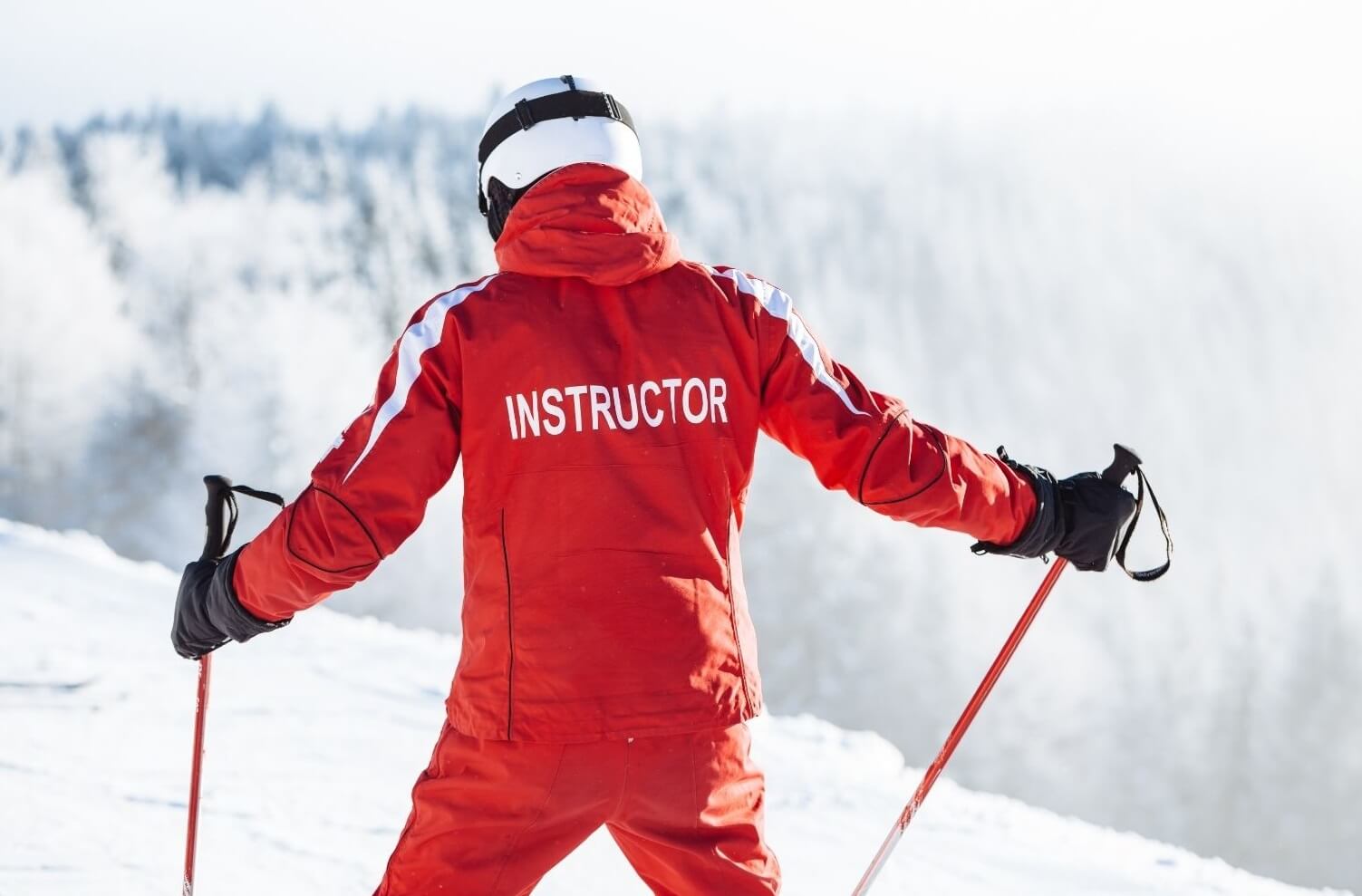What Are the Main Types of Ski Instructors?
To become a ski instructor is to specialise in different types of skiing, different degrees of experience, and different age groups, which means numerous possible careers exist. The major types of ski instructors are:
- Novice Ski Instructor: To become a ski instructor, you teach basic skiing techniques to beginner skiers. The fundamental skills covered include balance, control, stopping and making simple turns. Their focus is on skiers with no experience on the slopes, which means they work with people of all ages and provide gentle guidance so that they have a fun time on the slopes.
- Intermediate and Advanced Ski Instructor: Intermediate instructors work with already competent skiers who want to sharpen their skills. They are taught harder techniques, such as carving, parallel turns and steeper slopes. Advanced instructors work with well-trained skiers to perfect their speed, agility and technique on challenging terrain.
- Freestyle Ski Instructor: The instructor teaches jumps, tricks and park features. Most freestyle instructors teach students how to perform aerial manoeuvres, jump into the air, slide over a rail and perform other tricks found in a terrain park.
- Backcountry and Off-Piste Instructor: These instructors lead skiers through off-piste (i.e., ungroomed) terrain and backcountry zones outside the ski resort’s boundaries. To guide skiers safely through this uncontrolled environment, they should be knowledgeable about avalanche safety and rescue techniques and have a good understanding of snow conditions.
- Race Ski Instructor: Race instructors teach skiers how to compete. They teach advanced speed and agility skills and often work with skiers trying to compete, teaching how to increase speed and improve their turns and control.
- Children’s Ski Instructor: Patience, safety and child-specific ski-teaching methods are essential skills for children’s ski instructors. Children’s ski lessons must be tailored to keep the participants attentive, safe and motivated to learn to ski.
- Adaptive Ski Instructor: An adaptive ski instructor is a specialised ski instructor who can teach people with disabilities or special physical needs how to ski. Adaptive ski instructors use specialised equipment and techniques to match skiing techniques to the different needs of their students, allowing people with special needs to enjoy the sport of skiing.
Similarly, depending on which type of ski instructor you are, you may be required to have a different set of skills and certifications. This will simply reflect the type of instruction you provide and the type of terrain. Often, which specialisation you choose depends on your ability as a skier, your interests, and the teaching environment you’d like to ultimately be within.
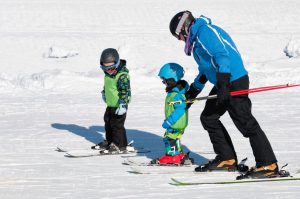
What Does a Ski Instructor Do?
To become a ski instructor, you show people or groups how to ski safely and properly, depending on their ability. The lessons are designed to suit the participants. Here’s a breakdown of the main responsibilities of a ski instructor:
- Assessing Skill Levels of Students: Teachers assess each student’s skill level to provide lessons that accommodate their current abilities. For instance, those who take beginner lessons have never skied before. In contrast, advanced skiers can benefit from fine-tuning specific techniques.
- Demonstrating and Teaching Techniques: To become a ski instructor, you demonstrate techniques, breaking them down into smaller, more understandable steps: for example, explaining the basics of balance and control, as well as more advanced techniques such as parallel turns and carving.
- Feedback and Adjustments: Instructors watch students on the slopes, offering feedback and suggestions to help them make adjustments and improve their technique. This feedback helps students to learn safely and gain greater confidence.
- Safety First: Instructors firstly focus on skiing safety because safety on the slope is the most important issue in skiing. They ensure students can control their speed, avoid some danger from the slope and obey the safety rules. For example, instructors may remind skiers that a good body position and a controlled leg action can help reduce the skis’ velocity and the chances of an accident.
- On-Slope Confidence Building: Beginners and new skiers need encouragement. Whether it’s a nervous child or an adult taking lessons for the first time, creating that sense of confidence and rewarding progress is the key to their enjoyment of the sport.
- Organising and Leading Group Lessons: Group lessons are commonly led by instructors who guide individual students through the motions of the activity while maintaining an awareness of the various skill levels within the group.
- Instruction in Mountain Safety and Etiquette: This is where students learn things such as mountain etiquette, how to share crowded slopes, respect other skiers, and follow the resort’s rules. Extended instruction includes avalanche safety in backcountry environments.
- A ski instructor has two main tasks: teaching and motivating the student, which means that one needs to have good knowledge of skiing techniques, knowledge of safety issues, and then the ability to communicate well with the student.
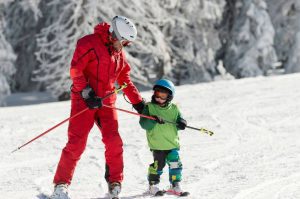
Average Ski Instructor Salary
Salaries for ski instructors vary depending on location, experience, and certifications. Here’s an overview of typical earnings for ski instructors:
- Entry-Level Ski Instructors: Beginner instructors can earn between £10 and £15 per hour in Europe or the UK, and between $15 and $20 per hour in the US. Seasonal earnings may vary, with instructors typically working only during ski season.
- Experienced Instructors: Experienced instructors with advanced certifications can earn between £20 and £35 per hour in Europe, and between $20 and $40 per hour in the US. They may also receive tips, especially if working with private clients.
- Advanced and Specialist Instructors: Instructors who specialize in advanced or niche areas like backcountry skiing, racing, or freestyle often earn more. Rates can go up to £50 or $60 per hour for private lessons, with potential for additional income from tips.
- Seasonal and Full-Time Contracts: Some resorts offer full-time seasonal contracts with guaranteed hours and benefits. Seasonal pay for these roles can range from £15,000 to £25,000 or more, depending on the resort and location.
- International and High-End Resorts: High-end or luxury ski resorts often pay more due to the exclusive clientele. Experienced instructors at such resorts may earn higher hourly rates, often with additional perks like accommodation and meals.
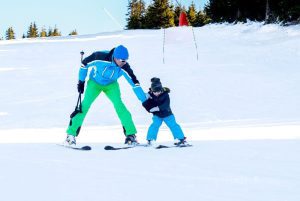
Ski Instructor Skills
To become a ski instructor, you need a mix of skiing expertise, communication skills, and the ability to manage diverse student needs. Key skills include:
- Skiing Proficiency: To become a ski instructor, you must have strong skiing skills to teach effectively and model techniques. Proficiency in skiing, along with in-depth knowledge of techniques, is essential.
- Patience and Empathy: Teaching skiing to beginners and children requires patience and empathy. Instructors must remain calm, understanding that students may take time to feel comfortable and master techniques.
- Effective Communication: To become a ski instructor, you need clear communication skills to explain techniques, provide feedback, and ensure students understand safety protocols. They often use simple language to help students follow instructions easily.
- Safety Awareness: To become a ski instructor involves risks, so instructors must be vigilant about safety, teaching students how to ski responsibly. Instructors need to assess slope conditions and student abilities to keep everyone safe.
- Adaptability: To become a ski instructor, each student has unique learning needs, and instructors must adapt their teaching methods to suit each individual. This skill is especially important in group lessons, where students may progress at different rates.
- Physical Stamina: To become a ski instructor is physically demanding, requiring instructors to be on the slopes for hours in varying weather. Physical fitness and stamina are essential to demonstrate techniques and keep up with students.
- Knowledge of Mountain Safety and First Aid: Basic knowledge of first aid and mountain safety is crucial, especially for instructors working in backcountry or advanced settings. Many instructors are required to be certified in first aid.
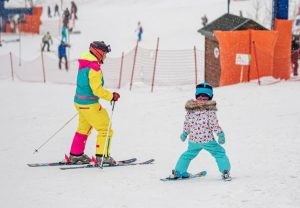
Ski Instructor Tips
Here are some essential tips for becoming a successful ski instructor:
- Work on Good Technique: To become a ski instructor, you must ski well to teach well. Work on perfecting your skiing technique and learning about different styles of skiing, which will assist you in demonstrating and teaching various skills.
- Learn to Adapt Your Teaching Style: Not every student learns the same way, and not every teaching style works for every person. You have to be flexible, adjusting to each student’s needs, pace, and comfort level on the slopes.
- Make Lessons Fun: Learning to ski is not easy, especially for beginners, so add fun to keep the students engaged. You can use games, a drill, or an exercise that lets the students feel they are having fun on the slopes.
- Safety Focus from Day One: To become a ski instructor, safety is paramount in every lesson. Students should know basic ski etiquette, safe stopping and avoiding collisions. This applies to all levels of skiers.
- Communicate clearly and effectively: Avoid technical terms – especially with beginners – and use simple, explicit instructions. Demonstrate each step of the technique and use visual cues and actual hands-on guidance to aid students in learning a new technique.
- Stay Positive: Learning to ski is intimidating, especially for the student. Encourage students to try their best and remind them to have a positive attitude. This will help them gain confidence and trust in your ability to lead them.
- Stay in Good Physical Condition and Be Ready: To become a ski instructor is a job that takes physical endurance. Do what you can to maintain good physical fitness, especially core strength and balance, and keep up with long days on the hill.
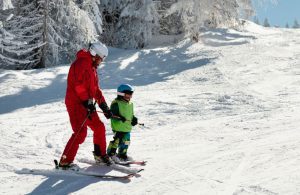
Ski Instructor Requirements
Becoming a ski instructor requires specific training, certification, and sometimes experience. Here’s an overview of what’s needed:
- Ski Instructor Certification: Most ski resorts require instructors to have a certification. The International Ski Instructors Association (ISIA) oversees many of the global standards. Common certifications include:
- BASI (British Association of Snowsport Instructors): The UK-based qualification with levels ranging from Level 1 (basic) to Level 4 (advanced). BASI qualifications are recognized internationally.
- PSIA (Professional Ski Instructors of America): The US-based certification, with three levels, suitable for teaching in the US.
- CSIA (Canadian Ski Instructors’ Alliance): The Canadian certification, offering levels from Level 1 to Level 4.
- NZSIA (New Zealand Snowsports Instructors Alliance): The New Zealand certification, which is also internationally recognized.
- First Aid Certification: First aid training is typically required for ski instructors, as they work in environments where injuries are possible. Many ski schools or resorts mandate first aid certification for safety reasons.
- Fluency in Relevant Language(s): Instructors at international resorts benefit from knowing multiple languages, such as English, French, or German. Being able to communicate with a diverse range of students enhances the learning experience.
- Relevant Experience: While not always mandatory, experience as a ski instructor assistant or working in ski schools is valuable. Practical experience helps you develop essential skills in instruction, safety management, and student assessment.
- Physical Fitness: Ski instruction requires good physical stamina. Instructors must have the endurance to ski for hours, handle various weather conditions, and demonstrate techniques repeatedly.
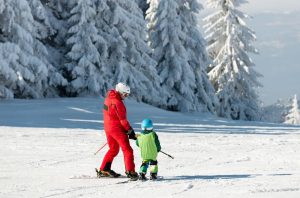
How to Become a Ski Instructor
If you’re interested in becoming a ski instructor, here are the key steps:
- Learn To Ski Well: If you want to take more advanced instruction, you must be an accomplished skier before starting. Take lessons, keep fit, and practice to get good before you go. Ski many different styles of terrain.
- Earn your instructor certification: Sign up for an instructor certification training course, which will be location- and goal-specific. There are three main certification types: BASI (British Association of Snowsport Instructors), PSIA (Professional Ski Instructors of America) and CSIA (Canadian Ski Instructors’ Alliance). All three are accepted at ski resorts across the globe and will qualify you for work.
- Get First Aid Certified: Take a first aid course; this is often a requirement to become a ski instructor. Have first aid skills on hand in case you have to tend to mild injuries.
- Get Experience: Work as an instructor’s assistant or volunteer with a ski school. This will give you a great experience teaching and being on the slopes with a group of kids.
- Apply For Instructor Jobs: Look for entry-level ski instructor jobs at resorts, schools, or outdoor centres. Highlight your ski experience, certifications and love of teaching.
- Think about Additional Certifications: If you plan to focus on another area, such as backcountry skiing, freestyle or adaptive instruction, please consider additional training. Several certifications offer speciality modules that help to expand our expertise.
- Network with other instructors and ski school managers: Connections are crucial in the ski industry – getting to know other instructors and ski school managers can open up new opportunities. Attend ski industry events and forums and engage with professional communities in the ski industry.
Frequently Asked Questions
Why Should You Become a Ski Instructor?
Working as a ski instructor is a great opportunity to combine a love for skiing with a love for teaching. Many of us want to help people, especially when giving others confidence in something we love. Instructors can help people of all ages enjoy skiing, whether just starting or looking to hone their skills and enjoy the mountains. If you love skiing and being outdoors, this is a great opportunity to combine these passions into a career.
Is Ski Instruction a Good Career Choice for You?
Ski instruction might be a good choice if you are a strong skier, have a zest for teaching, and flourish in outdoor environments. It’s a physically demanding career, suited to the energetic and likely those who are patient and enjoy sharing their knowledge and expertise.
What Are Typical Ski Instructor Salaries?
Ski instructor salaries are variable, depending on experience and location. An entry-level instructor can earn between £10-£15 per hour, while a more experienced one can earn £20-£50 per hour. A seasonal contract with a ski school will pay between £15,000 and £25,000. Other parts of the income might come from tips or from giving private lessons.
Which Qualifications Can Help with a Career in Ski Instruction?
BASI, PSIA (the American system), and CSIA (Canadian) are the most common certifications. They are mandatory at almost any ski school. A first aid certification is also a must. And advanced certifications if you want to specialise in backcountry skiing, freestyle instruction, etc.
Do I Need to Be Experienced to Get Started?
You need to be an experienced skier to qualify. Still, you don’t necessarily need previous teaching experience to get the entry-level certification. Working in a ski school as a volunteer or an assistant can help you get teaching experience before you leap.
What Is the Ski Instructor Career Outlook?
However, the demand for ski instructors is still strong in the most popular and classic and emerging ski destinations. The possible jobs range from seasonal to full-time jobs in all resorts. The position in the ski school can evolve with the candidate, from the position of ski instructor to senior instructor, ski school manager, specialisation, etc.
Ski Instructor Hierarchy and Progressing Within the Role
Ski instructors can become senior instructors, head instructors or ski school managers. More experienced instructors with specialist qualifications may work as examiners, training and certifying instructors.
Ski Instructor Exit Options and Opportunities
Most who have been teaching for a while move into things such as ski school management, outdoor adventure guiding, work in the tourism and hospitality field, ski resort operations, and/or starting their coaching and guiding businesses.


